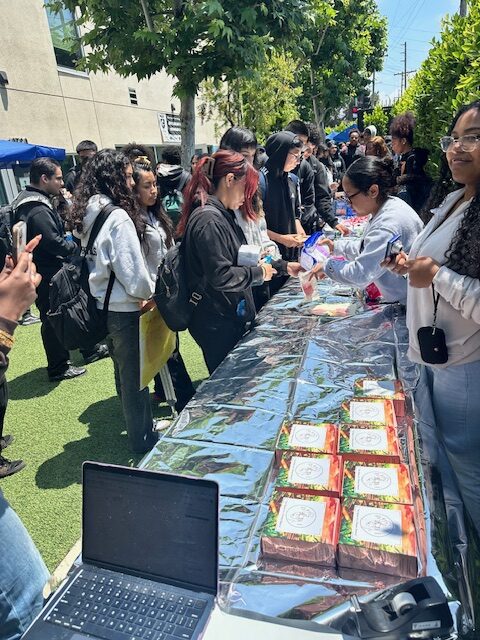At 17 years old, Titilope Olotu begun realizing her dream of bridging the menstrual care gap in Nigeria.
She saw many young girls and women in Ibadan where she grew up, improvise rags and pieces of bed foams as menstrual pads during their menstruation due to lack of accessible menstrual products. To Olotu, a decent menstrual cycle felt like a privilege.
“The motive and the mission started in October of 2023. The idea was about bridging menstrual disparities in Nigeria. Given the fact that I’m an immigrant from Nigeria, I wanted to extend the support and the menstrual privilege that I had,” Olotu told The African Dispatch.
An ‘unplanned’ journey that started with TikTok

Now 19 years, Olotu says her journey to develop ‘Padi’ the first biodegradable sanitary pad that uses Artificial Intelligence to detect problems with women’s menstrual cycle was “unplanned.”
As a third year Biology student at the University of California (UCLA), Olotu started a campaign on Premenstrual dysphoric disorder (PMDD) to assess menstrual cycle related conditions developed by women.
“As I looked into it, I realized that some women started to talk about some other conditions and BV was a major one,” she said.
Bacterial Vaginosis is an infection of the vagina caused by excessive growth of bacteria and can contribute to antibiotic resistance. According to the World Health Organization, it affects between 23–29% of women of reproductive age.
“Out of 212 women, 12 came back to me and they said they had anti biotic resistance and doctors said they needed to find a natural remedy. So, at the time I researched TikTok and there was this castor oil trend, so I created a procedure for these women” Olotu explained.
Even though the castor oil solution to BV was successful, Olotu decided to find a more scientific and safe solution to these menstrual related conditions in all women, which led to the birth of Padi, an AI-powered biodegradable sanitary pad.

How does Padi work?
Olotu explains that menstruating women “basically just menstruate on the pad like how you use your regular menstrual pad. But the difference of this pad is basically, you are able to flip the pad over and right there you have a readout with different color analysis.
I usually use purple, so for example when we talk about iron and trying to understand the concentration of what you have in the menstrual blood, you understand that if it’s a darker shade then it’s more concentrated.”
The pad works with an AI powered platform where users can scan the readout at the back of the pad and get a health analysis. After receiving the readout, the app analyses the user’s condition by asking further questions on symptoms to give possible diagnosis.
“For example, it will ask you, are you growing hair around your face, are you feeling fatigue, do you think often, do you feel lightheaded, or is your hair falling off, all these things will not give you a comprehensive analysis of different things that you can take practical insights on,” Olotu said in the interview with The African Dispatch.
For Titilope Olotu, the goal of the innovation is to allow all menstruating women to take proactive care and empower themselves during their menstrual cycles.
She believes women can have easy options to check on their menstrual health through just a sanitary pad and an app.
Is Padi accessible?
Padi is currently not out in the market yet. Olotu tells The African Dispatch that her team is currently involved in getting the product for preclinical trials in 2026 and launch the AI powered platform by April 2026.
“We understand that helping women more practically with their health takes a lot of time and that’s why we are not rushing and getting it out. If you look on the market today, there are already strips that works individually, so you can test for iron or fertility, but one agent that has multiple biomarkers is not in existence,” she explained.
Olotu says next year’s trials will be piloted in Nigeria, where she was born.
“I’m definitely going back to Nigeria because a majority of women are waiting to receive these products and to test them. I’m from Ibadan so we’re looking into Ibadan, Akure and some parts of Lagos,” she noted, adding that the trial will partner a licensed medical facility to ensure the accuracy of the trials.
Why is tackling period poverty a big deal for Olotu?

Reports indicate that more than 37 million women and girls in Nigeria, cannot afford menstrual hygiene products. That is more than 30 percent of the country’s female population.
With the average cost of a menstrual pad in Nigeria is between 3,000 to 16,000 Naira ($2-$11), Olotu hails a new recognition of menstrual health as a national development priority by the Nigerian government.
The draft policy proposes tax exemptions for Nigerian-owned companies producing organic and reusable sanitary pads, with the aim of improving affordability and access.
It also advocates for the integration of menstrual health education into the primary and secondary school curricula.
If finalized and implemented, Olotu believe this policy would allow Nigeria to tackle period poverty as a fundamental to achieving gender equity, education, and national productivity.
‘The Nigeria I want to see in 20 years‘
In 20 years from now, Titilope Olotu tells The Africa Dispatch that she wants to see a Nigeria that talks about menstruation without shame and stigma.
“I think that the shame and the stigma that comes with menstruation is very scary,” she noted.
In addition, she wants the country to revolutionize its education system, particularly on menstrual education.
“When I think about my menstrual education that I received as a student in Nigeria, there were a lot of gaps, a lot of misinformation. I think they are clearly very male centered. I will hear things like do not let a man know that you are on your period, or do not ask any male figure to buy you menstrual,” she stated.
Watch excerpts of Titilope Olotu’s interview with The Africa Dispatch on YouTube with the link below:










